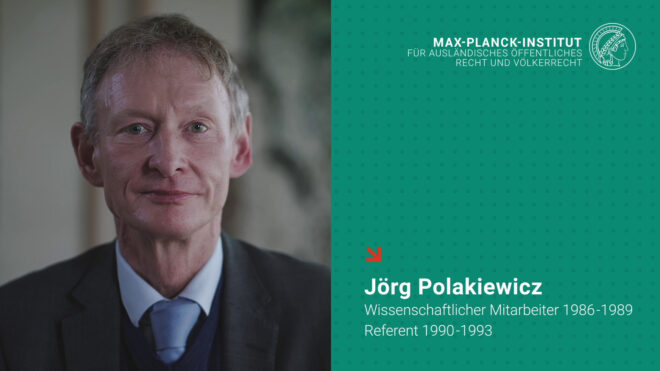How does a scholar trained in the quiet libraries of Heidelberg end up crafting the legal response to a war of aggression? For Jörg Polakiewicz, Director of Legal Advice at the Council of Europe, the answer lies in a specific intellectual DNA: the “Heidelberg Method”—a disciplined fusion of doctrinal rigour and comparative analysis that has proven unexpectedly vital in times of geopolitical fracture. Polakiewicz’s journey begins in the late 1980s, where the Institute served as a calm island amidst the storm of reunification. He recalls the surreal disconnect of November 1989: while the Berlin Wall fell, debates continued in the institute’s seminar rooms as if nothing had happened. He also candidly admits to a “Western bias” that once rendered the East invisible to him. It was only through the Institute’s guests that he encountered the suppressed histories of the Baltic states, sparking a realisation that would define his career: a legal order built only on Western assumptions is fragile. Today, as the Council of Europe confronts Russia’s war against Ukraine, Polakiewicz demonstrates how academic theory transforms into political survival. From the confidential corridors of the 1990s to the transparent, civil-society-driven landscape of today, he traces the evolution of European human rights protection. He argues that the Council’s power lies not in political muscle, but in its technical legal credibility—a credibility forged in the very methodology he absorbed decades ago. In conversation with Alexandra Kemmerer, Head of MPIL’s Berlin Office, Polakiewicz reveals how the networks built in Heidelberg continue to shape the architecture of international law, proving that in an era of crisis, the most durable weapons are often forged in the rigorous, quiet work of the legal scholar. The interview was recorded at the institute on January 11, 2025.
About Jörg Polakiewicz
Jörg Polakiewicz is the Director of Legal Advice and Public International Law at the Council of Europe, where he has served in various key capacities since 1993. A former research fellow at the MPIL (1986–1993), he is a leading authority on the interplay between international law and European human rights mechanisms. His work has been instrumental in navigating complex legal challenges, including the EU’s accession to the ECHR and the legal responses to the conflict in Ukraine. He is also an Honorary Professor at the Europa-Institut, the Saarland University International Law School in Saarbrücken.


